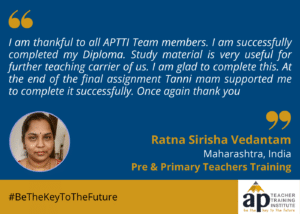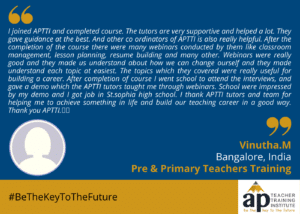10 Must-Have Skills to be a Successful Pre-Primary Teacher
Teaching a large group of children in the classroom can be an interesting and satisfying task. The enthusiasm and zeal of the students can wipe out your stress, while the positive vibes that they bring can keep things bright and optimistic.
Do you also plan to be a pre-primary teacher and contribute to children’s physical, social, cognitive, and emotional development? Then, enrol in a pre-primary teacher training course and hone these skills –
-
Patience
Handling children is not easy. They can sometimes be obstinate, loud, sentimental, and irrational. So, without having patience, teachers can’t manage them effectively. A pre-school teacher should be prepared for any situation – from handling low concentration levels to mood swings to many more.
Patience is a great skill and asset for you to possess. Completing an online pre-primary teacher training course will help you understand the significance of patience in the teaching profession. It will help you deal with kids and the continuous queries and concerns that parents can have about the progress of their toddlers.
-
Critical Thinking
Another must-have skill for pre-primary teachers! With this, you can consider the best interests of the students while also working within their institutional goals and standards. Being a responsible teacher of a primary school, you should also be aware of parents’ expectations for learning and discipline and make sure that the classroom is a safe and nurturing environment.
For example, a pre-primary English teacher with well-developed critical thinking skills should consider the themes of a story before deciding whether it is appropriate for the children.
-
Creativity
No, you don’t need to be an artist to be a pre-school teacher. There are several other ways to define your creativity. Do you like to solve problems? Or can you invent new ways to do a mundane thing? Can you connect two dots between two seemingly unrelated topics? If yes, then you can create and inspire others.
When it comes to being creative in the classroom, you can find several ways to showcase your creativity. Creative teaching is all about using the existing resources to create an engaging learning experience. On the flip, creative teaching can help your class think out of the box and express themselves through creativity.
-
Communication
Communication is more than words. It is about picking the emotion of a people before they say something. It is about active listening, about telling someone that you care about them with a simple gesture. You can learn other people’s quirks before you come to a judgment. You can take the time to understand because communication is not one-size-fits-all.
One of the reasons people find it difficult to communicate with kids is that they don’t communicate the way we do. In place of speaking a complete sentence, they utter some scattered words for everything they feel. As a pre-school teacher, you need to discover what is going on beneath to help kids find better ways to communicate.
-
Energetic
Whether your family members and friends admit it or not, you are a morning person. However, it is not just about having energy. You are excited and engaged. Others may yawn at a rainbow over their daily commute, but you would never miss a chance to marvel.
It is no surprise that kids are full of energy. So, it is essential to be engaged in what they are doing – even it may seem trivial. Kids discover new things all the time and want you to be as excited as they are. It may take a lot of energy, but if you are the kind of person who can make boring things interesting, you won’t have a problem.
-
Collaboration
You are not above getting on someone else’s level. And you don’t need to be the centre of attention. But if making a boat from paper or dancing like a monkey can cheer a kid, you should do this. You will dive deep into your inner child rather than hold on to your adult perspective. You should know that kids have as much to offer as you have to provide them with.
Of all the people you collaborate with as a teacher, your students are the most vital ones. So, as a pre-school teacher, you are not only responsible for showing preschoolers how things work out but help them discover it for themselves. And if you have ever had a teacher hand out lessons like final verdicts, you might know how hard it is to pay attention when you feel left out.
-
Balance
Keeping a balance is essential in our lives. Just because something is not perfect, it does mean that it is a lost cause. If you think that everything will go as you have planned in pre-school, don’t join a pre-school. Things hardly go as you think or plan.
Find a balance between structure and spontaneity. Sometimes you will need to give into the class’ enthusiasm for more games about a topic, while other times, you can reel them back into a finished storyline. When you ride with the waves, it is all part of the fun. It is about knowing what is more important – whether it is planned or not.
-
Open-minded
As important as it is to be curious, being open to other’s suggestions and ideas is a crucial success factor for a teacher. Being open to your colleagues and management’s suggestions and being receptive to children’s ideas in class as a teacher is essential for you. Respecting different opinions and still working as a team has its rewards. Being a teacher, you are a performer, the classroom is your stage, and your students are your audience who observe you continuously. All the skills and qualities that you model as an early educator get imprinted in their young minds forever.
-
Classroom Management
One of the most outstanding teaching skills that are often underestimated is classroom organisation and management skills. Managing a classroom, especially one that is full of energetic children, is a daunting task. It is because you need to have a systematic approach for his. From creating a routine and striking a balance to supervising the kids to implementing the children’s daily rules and regulations, there are plenty of aspects to it. And it would be best if you mastered every aspect to manage a classroom effectively.
-
Conflict Resolution
Part of a pre-primary teacher’s responsibilities includes managing disagreements in a classroom. You can encounter conflicts over sharing resources like books, copies, pencils, games or toys.
During a teacher training program, you will learn how to resolve conflicts successfully. Besides, with well-developed conflict resolution abilities, you can display patience, consider each viewpoint and come to a point. This skill will also help you when disagreements arise between the teacher and the parents of a student.
These are the primary skills that are important to be a successful pre-primary teacher. Do you have some of the skills and want to work on the rest ones? Enrol in APTTI’s pre-primary teacher training course and be a new-age teacher.
Image Source: Freepik.com








